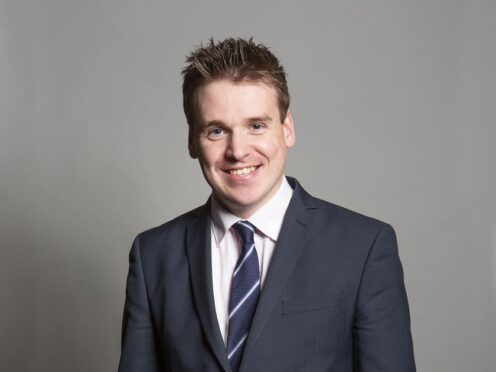
A Conservative MP has said his dyspraxia caused him to misplace his photo ID, forcing him to arrange an emergency proxy vote for Thursday’s local elections.
Tom Hunt, who represents Ipswich, warned people “persecuting” him online to be “very careful with their words”, saying it is “well known that sadly we are slightly more prone to lose things”.
Voters are required to present certain forms of ID to take part in Thursday’s local, mayoral, and police and crime commissioner polls.
This is because of the Elections Act 2022, a law change first put to the test during the May 2023 local elections.
Acceptable forms of ID listed in the Act include a passport, driving licence, Proof of Age Standards Scheme (Pass) cards, Blue Badges, and some concessionary travel cards.
Mr Hunt told the PA news agency: “I don’t want to blame everything on my dyspraxia, but it’s a factor in my life I have to deal with.
“It’s all well and good people saying we need to have more neurodiverse Members of Parliament, but having a massive pile-on on them, I don’t think it’s going to encourage more people.”
People whose ID has been lost, stolen or damaged can apply for an emergency proxy vote until 5pm on polling day, allowing someone else to vote on their behalf.
Mr Hunt said he had not previously been aware of this provision, but had applied for an emergency proxy vote, saying it is “the system working well”.
One form of ID that is not accepted at polling stations is the veterans ID card, introduced at the start of this year.
Veterans minister Johnny Mercer issued an apology via social media site X, formerly Twitter, after former soldier Adam Diver was unable to use his veterans card at a polling station.
“I am sorry about this,” Mr Mercer wrote in response after Mr Diver was turned away from his polling station.
He added: “The legislation on acceptable forms of ID came out before the veterans ID cards started coming out in January this year. I will do all I can to change it before the next one.”
I am sorry about this.
The legislation on acceptable forms of ID came out before the veterans ID cards started coming out in January this year. I will do all I can to change it before the next one. https://t.co/COY0n6vIEo
— Rt Hon Johnny Mercer (@JohnnyMercerUK) May 2, 2024
Army veteran Mr Diver, 48, had been looking to place his vote in Fleetwood, Lancashire, but was turned away after presenting his veterans card, saying the experience left him feeling “gutted”.
“I felt clearly deflated, I felt gutted to be fair and upset – I felt angry at the point,” Mr Diver, who served in the army for 27 years, told the PA news agency.
“I felt like my time served was invalidated and I just thought to myself, ‘what was the point in that?’
“I’ve served in pretty much every war going, I’ve spent 27 years away from my family.
“I thought you could use it as an ID card. It’s like a driving licence, you can’t get any more official and it didn’t strike me one bit that it wouldn’t be validated.”
Both Mr Hunt and Mr Mercer voted for the voter ID scheme when it was before the Commons.
According to Parliament’s voting records, they also voted to reject a Lords amendment aimed at widening the forms of acceptable identification to include workplace ID, library cards, bank statements and an array of other documents.
Ministers are currently consulting on whether to include veteran cards in the list of approved forms of ID.
A Government spokesperson said: “Our intention is for the new veteran card, which was rolled out in January 2024, to be added to the official list of recognised identification – and we are already consulting on this.
“Defence identity cards for serving Armed Forces members are already accepted.”
An investigation by the Electoral Commission suggested around 14,000 people – 0.25% of voters – did not vote in last year’s local elections after being unable to show an accepted form of photo ID at their polling station.
A similar study will be carried out this year, the Commission has confirmed.

Enjoy the convenience of having The Sunday Post delivered as a digital ePaper straight to your smartphone, tablet or computer.
Subscribe for only £5.49 a month and enjoy all the benefits of the printed paper as a digital replica.
Subscribe